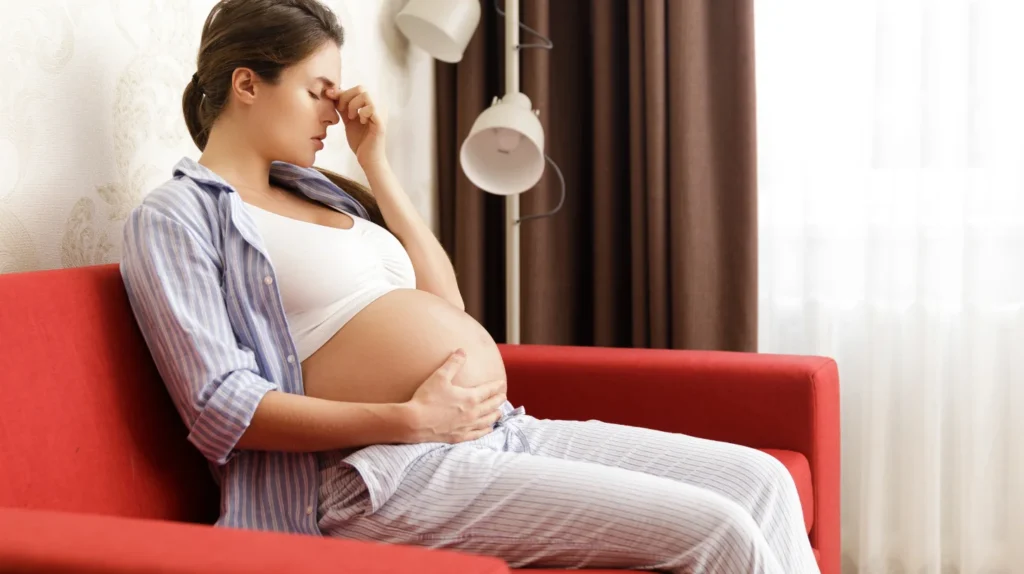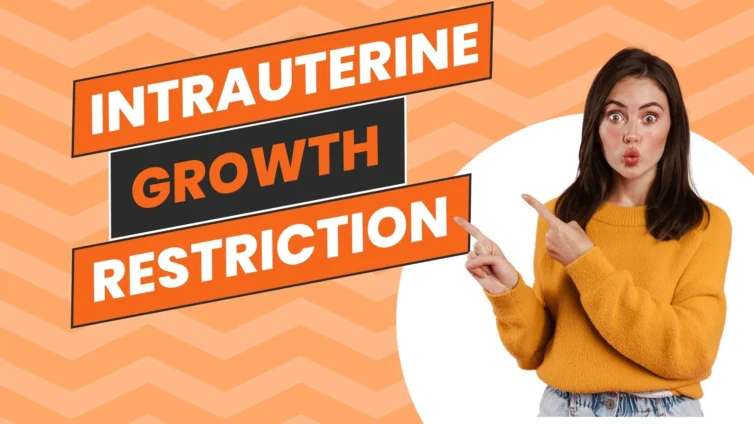
High blood pressure during pregnancy can be a daunting health concern for many expectant mothers. It’s alarming to learn that unmanaged high blood pressure may decrease the baby’s supply of nutrients and oxygen, leading to potential complications.
In this valuable read, we’ll delve into the causes, symptoms, types, and potential complications of high blood pressure in pregnancy. Moreover, we’ll discuss preventive measures and management strategies to ensure both mother and baby stay healthy.
What is High Blood Pressure?
High blood pressure, also known as hypertension, is a common health concern experienced by many individuals worldwide. It refers to the condition where the force of the blood against the walls of the arteries is consistently too high.
During pregnancy, having a normal blood pressure range is crucial for the health of both mother and baby. High blood pressure during pregnancy may indicate an underlying issue that needs to be addressed promptly by your doctor. Understanding the significance and implications of high blood pressure in pregnancy is the first step in effectively managing this condition.
Types of High Blood Pressure During Pregnancy
There are different types of high blood pressure that women can develop during pregnancy. Let’s discuss them in detail:
1. Chronic Hypertension
Chronic hypertension is high blood pressure that was present before pregnancy or that occurs before 20 weeks of pregnancy. However, it can be hard to determine if it started before pregnancy, especially if a woman doesn’t regularly monitor her blood pressure at home.
2. Gestational Hypertension
Women with gestational hypertension develop high blood pressure after the 20th week of pregnancy. There is no excess protein in the urine or other signs of organ damage. Some women with gestational hypertension may eventually develop preeclampsia.
3. Preeclampsia
Preeclampsia is a pregnancy complication characterized by high blood pressure and signs of damage to another organ system, often the liver and kidneys. Preeclampsia usually begins after 20 weeks of pregnancy in women whose blood pressure had been normal. Even slight rises in blood pressure can be a sign of preeclampsia. If left untreated, preeclampsia can have serious — even fatal — complications for both mother and baby.
Risk Factors for High Blood Pressure During Pregnancy

Understanding the risk factors for high blood pressure during pregnancy can help future parents be more proactive in maintaining a healthy pregnancy. These include:
1. First-time pregnancy:
The risk of developing high blood pressure is higher during your first pregnancy.
2. Family history:
Having a family history of pregnancy-related hypertension puts you at higher risk.
3. Multiple pregnancy:
If you are pregnant with more than one baby, your risk of developing high blood pressure is increased.
4. Age:
The risk of high blood pressure during pregnancy is higher for pregnant women over 40.
5. Obesity:
Being overweight or obese increases your risk of developing high blood pressure during pregnancy.
6. Pre-existing medical conditions:
If you have kidney disease, diabetes, autoimmune disease, or certain heart or blood vessel conditions, you may be more likely to develop high blood pressure during pregnancy.
Symptoms of High Blood Pressure in Pregnancy

Although high blood pressure can sometimes be symptomless, certain signs might indicate an increase in your blood pressure. Here are some symptoms to be mindful of:
1. Severe headaches:
Experiencing severe headaches can be a sign of high blood pressure during pregnancy. If you notice a sudden onset or change in the pattern of headaches, consult with your doctor.
2. Changes in vision:
Blurred vision, seeing spots, temporary loss of vision, or light sensitivity can be a sign of high blood pressure or even preeclampsia.
3. Upper abdominal pain:
Typically experienced on the right side, under the ribs, this can be a sign of preeclampsia. This pain can sometimes be mistaken for heartburn.
4. Nausea or vomiting:
While this can be a common part of pregnancy, a sudden onset of these symptoms during the second half of pregnancy could indicate high blood pressure or preeclampsia.
5. Shortness of breath:
Sudden shortness of breath can suggest a problem with your heart or lungs, possibly due to high blood pressure.
Remember, if you’re experiencing any of these symptoms, it’s crucial to consult your doctor immediately.
Potential Complications of High Blood Pressure During Pregnancy

When you have high blood pressure during pregnancy, it’s not just your health at risk; your baby’s well-being can be affected too. The severity of these complications often hinges on the type of high blood pressure you have and when it first appears during your pregnancy.
1. Preeclampsia:
Preeclampsia is one of the more severe complications that can arise from high blood pressure. Typically appearing after the 20th week of pregnancy, this condition can cause organ damage, most commonly to the liver and kidneys. Look out for signs such as a rapid rise in blood pressure, protein in your urine, severe headaches, and visual disturbances.
2. Eclampsia:
In some extreme cases, untreated high blood pressure can lead to eclampsia, a severe condition that causes seizures and is life-threatening.
3. Preterm Birth:
If high blood pressure disrupts the blood flow to the placenta, your baby might not get enough oxygen and nutrients. This situation can lead to slow growth or premature birth, defined as a birth before 37 weeks of pregnancy, which can trigger various health issues for your baby.
4. Placental Abruption:
In some cases, high blood pressure can cause the placenta to prematurely separate from the uterus’s inner wall, a condition known as placental abruption. This can be dangerous for both mother and baby.
5. Early Induction of Labor:
If high blood pressure worsens, it may be necessary to induce labor before your due date to prevent further complications.
6. Cesarean Birth:
Cesarean births are more common among women with high blood pressure during pregnancy. Though generally safe, C-sections require a longer recovery period than vaginal births.
7. Future Cardiovascular Disease:
Experiencing high blood pressure during pregnancy can increase the risk of cardiovascular disease later in life.
Controlling High Blood Pressure During Pregnancy

Maintaining a healthy lifestyle can play a key role in managing your blood pressure during pregnancy. Here are some suggestions that may help:
1. Regular prenatal visits:
These visits allow your doctor to closely monitor your blood pressure. Regular check-ups can help detect any potential issues early.
2. Balanced diet:
Eating a variety of foods, focusing on whole grains, fruits, vegetables, and lean proteins can contribute to better overall health and controlled blood pressure.
3. Moderate exercise:
Regular physical activity can help reduce high blood pressure. Always consult your doctor before starting any exercise regime during pregnancy.
4. Limit sodium intake:
Too much sodium can contribute to high blood pressure. Limit processed foods, and try adding less salt to your meals.
5. Stay hydrated:
Drink plenty of fluids, especially water. This helps keep your body hydrated and aids in managing blood pressure.
6. Avoid alcohol and tobacco:
Both alcohol and tobacco can raise your blood pressure and have other harmful effects during pregnancy.
While these lifestyle changes can help manage high blood pressure, in some cases, medication may be needed. Always consult with your doctor to create the best plan for you and your baby.
Dealing with Chronic Hypertension Before Pregnancy

If you had chronic hypertension before your pregnancy, managing it becomes all the more crucial during this critical period. Chronic hypertension is high blood pressure that was present before you got pregnant or that occurs in the first 20 weeks of pregnancy.
1. Regular Check-ups:
Regular check-ups are vital for monitoring your blood pressure and ensuring that your medication, if any, is safe to take during pregnancy. These check-ups also provide an opportunity to monitor the growth and health of your baby.
2. Medication Review:
If you are already on medication for hypertension, your doctor may need to review it. Some blood pressure medications are not recommended during pregnancy due to potential harm to the baby. Your doctor will help determine the safest treatment for you and your baby.
3. Healthy Lifestyle:
Maintaining a healthy lifestyle is key to managing chronic hypertension. Regular exercise, a healthy diet, limiting salt intake, avoiding alcohol and tobacco, and keeping stress levels in check can help manage your blood pressure.
4. Preconception Counselling:
If you have high blood pressure and are planning a pregnancy, preconception counseling is beneficial. This counseling can help you understand the potential risks and the steps you can take to have a healthy pregnancy.
Having chronic hypertension does not mean you can’t have a healthy pregnancy. With careful management and regular check-ups, many women with high blood pressure have successful pregnancies.
High Blood Pressure in Pregnancy: What It Means for Your Future Health

Having high blood pressure during pregnancy can have implications for your health in the future. However, with appropriate management and follow-up care, you can lead a healthy life post-pregnancy.
1. Future Cardiovascular Risk:
Women who have had high blood pressure or preeclampsia during their pregnancies may have a higher risk of chronic hypertension, heart disease, and stroke later in life. Regular check-ups and maintaining a healthy lifestyle can help manage this risk.
2. Reoccurrence in Future Pregnancies:
If you had high blood pressure during a previous pregnancy, you are at risk of developing it in subsequent pregnancies. It is crucial to inform your doctor of your medical history to ensure appropriate care and monitoring.
3. Risk of Type 2 Diabetes:
Studies show that women who develop high blood pressure in pregnancy may have an increased risk of developing type 2 diabetes later in life. Regular screening and maintaining a healthy diet and lifestyle can help prevent this.
4. Long-term Kidney Problems:
Although rare, some women may develop kidney problems as a result of high blood pressure during pregnancy. Regular monitoring of blood pressure and kidney function can help detect and manage this complication.
While these future health risks may sound daunting, remember that they are not guaranteed. They are potential risks, and with proper post-pregnancy care, they can be significantly reduced. Always keep in touch with your doctor, follow the prescribed care plan, and take good care of your health, for a safe pregnancy and a healthy future.
KEY TAKEAWAYS
1. High blood pressure during pregnancy is a condition that needs prompt attention due to its potential to cause serious health issues.
2. The three main types of high blood pressure during pregnancy are chronic hypertension, gestational hypertension, and preeclampsia.
3. Regular prenatal check-ups are crucial for early detection and management of high blood pressure.
4. Some complications of high blood pressure in pregnancy include preeclampsia, preterm birth, placental abruption, and future cardiovascular disease.
5. Management of high blood pressure during pregnancy involves lifestyle changes and, if necessary, medication.
Final Thoughts
High blood pressure in pregnancy is a matter not to be taken lightly. With potential complications ranging from preterm birth to future cardiovascular disease, it’s crucial to stay vigilant about maintaining normal blood pressure throughout the pregnancy. As your trusted doctor, I urge you to attend regular prenatal check-ups, adopt a healthy lifestyle, and closely monitor your blood pressure. By doing so, you’re taking a significant step towards ensuring a safer, healthier pregnancy journey for both you and your baby.
Frequently Asked Questions (FAQs) about High Blood Pressure in Pregnancy
What is gestational hypertension?
Gestational hypertension is a type of high blood pressure that develops after the 20th week of pregnancy. Unlike chronic hypertension, gestational hypertension usually returns to normal after the baby is born.
What are the symptoms of preeclampsia?
The symptoms of preeclampsia can include persistent headaches, changes in vision, upper abdominal pain, and sudden weight gain. However, some women may not experience any noticeable symptoms.
How can I prevent high blood pressure during pregnancy?
You can help prevent high blood pressure during pregnancy by maintaining a healthy lifestyle, including regular physical activity, a balanced diet, avoiding harmful substances like tobacco and alcohol, and attending regular prenatal check-ups.
How can I control my blood pressure during pregnancy?
You can control your blood pressure during pregnancy by maintaining a healthy lifestyle, such as eating a balanced diet, exercising regularly, avoiding smoking and excessive caffeine, and regularly monitoring your blood pressure.
How does high blood pressure affect the third trimester of pregnancy?
High blood pressure in the third trimester of pregnancy can increase the risk of complications such as preterm birth, preeclampsia, and placental abruption. Regular prenatal check-ups are critical during this time.
What is the treatment for high blood pressure in pregnancy?
The treatment for high blood pressure in pregnancy may involve lifestyle changes, medication, or even hospitalization in severe cases. It’s crucial to follow your healthcare provider’s advice for managing your blood pressure.
What is normal blood pressure during pregnancy?
Normal blood pressure during pregnancy is usually around 120/80 mm Hg, but it can vary. A reading of 140/90 mm Hg or higher on two occasions could indicate high blood pressure.
How often should I check my blood pressure during pregnancy?
Your healthcare provider will likely check your blood pressure at each prenatal visit. If you have high blood pressure, your doctor may recommend more frequent checks or home monitoring.





